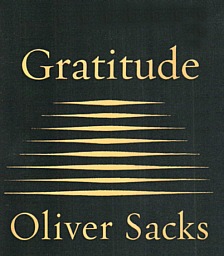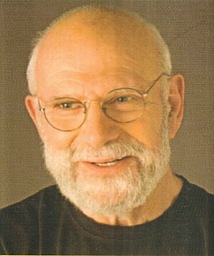On the Move was the title of a book in which Sacks gave a recap of his early life. As his life was
constantly on the move, no title could have been better. He led a mercurial life, constantly moving around
and through obstacles as he sought to help people to survive the various neurological and physical
disorders life had thrown at them. In his 80th year, life threw a curve at him, threatening to bring his
quicksilver career to an abrupt stop. He reveals to us how in a dream, some rising and falling globules of
Mercury, Atomic No. 80, appeared to him, a few days short of his 80th birthday in 2013. He wrote the first
essay in this book, "Mercury," celebrating old age. He would die shortly after his 82nd birthday, but he had
completed the remaining three essays knowing that his end was near. Here is how he begins the book
which contains these four short essays, with a truly poignant declaration:
I am now face to face with dying,
but I am not finished with living.
If you live long enough all your friends will die. I heard that expressed many years ago, and it induced
a goal in me to be making new friends in each decade of my life. This is a sensible goal, like creating
more oxygen when your space suit on Mars is running out of oxygen. Sacks says about being 80:
[page 9] A third of one's contemporaries are dead, and many more, with profound
mental or physical damage, are trapped in a tragic and minimal existence.
This is Sacks' view as a medical scientist, for whom all suffering is tragic. To a spiritual scientist,
all suffering is not tragic, even if it is unwelcome. Rightly understood, so-called tragic circumstances are
concomitant with a personal working out of karma. When people left New Orleans after Hurricane Katrina
to escape hurricanes, they found themselves beset by firestorms, tornadoes, ice storms, floods,
earthquakes, and mudslides, among other things. They could have used their experience to discover that
wherever you go, your karma follows you. You can change the exact situations of its working out, but you
cannot forestall its working out. Someone once told me that life is like being on a sea journey and
knowing the ship will sink. What makes life tragic is the popular illusion that we each get only this one
journey. (This seems to have been Oliver Sacks' illusion as a materialist, one he hinted in some of his
books.)
Francis Crick was a friend of Sacks and when he was told his colon cancer had returned, he went
right back to work. Sacks says on page 10, "When he died, at eighty-eight, he was still engaged in his
most creative work." This is the glory of the 80's, which I look forward to. When I decided to retire at age
55 to write full-time, I was told I would receive a pension for 40 years, and my immediate thought was,
"Darn! At 95, I will have to go back to work!" The presupposition of that thought was a deep-seated belief
that I will work well past 95 years old, and I have already passed the halfway mark to 95. What are your
presuppositions about living, life, and longevity? Check them out as they will forestall any attempts you
make to live a long life, as presuppositions are always silently at work in the background of your mind,
out of your consciousness, but shaping the course of your life. EAT-O-TWIST never breaks, my wife said
one time when I made some all-too-human comment of despair. The acronym stands for "Everything
Allways Turns Out The Way It's Supposed To." Change "Supposed to" to "Presupposed To," and it's
equally true. Bandler and Grinder recognized the power of presuppositions to shape people's lives and
collected a list of them for their classic book, The Structure of Magic, Volume 1. You can find this list in
Footnote 2. If you suppose that presuppositions are useless, you will be right; they will be useless to you.
If you change your presuppositions about life, you can create miracles. "A miracle", the Course in
Miracles tells us, "is a change in attitude." One's attitudes are shaped by one's presuppositions, are they
not?
As Sacks was musing over old age, he shared in Essay One:
[page 10] One has had a long experience of life, not only one's own life, but others'
too. One has seen triumphs and tragedies, booms and busts, revolutions and wars,
great achievements and deep ambiguities. One has seen grand theories rise, only to
be toppled by stubborn facts. One is more conscious of transience and, perhaps, of
beauty.
I have seen grand theories arise, one back in the 1970s when Newsweek Magazine proclaimed on its
cover, "New Ice Age is Coming", only the stubborn facts showed the Earth continued to get warmer. The
next grand theory was "Global Warming", and once again the stubborn facts show the Earth is not getting
warmer, especially not due to any man-made influences like carbon emissions. The jury is still out on this
one, but I'm making the call that this grand theory is headed for the dustbin of science along with
phlogiston, etal, but not before thousands of scientists have sucked the tax coffers dry in their attempt to
prove that the ever-varying temperature of the Earth is rising and will wipe out humanity. Posterity, if
there is one, will certainly prove them wrong.
In the last sentence of the page 10 quote above, I was reminded of a quote from Rudolf Steiner about
beauty: "This is generally true: inner qualities grow out of the past, but beauty is created by the present."(1)
Materialistic scientists, like Oliver Sacks, work with the inner qualities accumulated from past
experiments and experience which have been formed into theories, but beauty is transient: it appears in
the present moment, often arriving unbidden and unexpected. To become aware of beauty one must move
from accreted substance of scientific theories into the direct awareness of the here and now, from a mental
construct into a feeling of awe in the presence of beauty. Even the phrase "in the presence of beauty"
points to an experience in the present, which is the only place where presence makes sense.
After Sacks received notice of the metastases of his liver, he reported a change in his world.
[page 18, 19] I feel a sudden clear focus and perspective. The is no time for anything
inessential. I must focus on myself, my work, and my friends. I shall no longer look
at NewsHour every night. I shall no longer pay attention to politics or arguments
about global warming.
Amen! This reminds me of an elderly friend of mine who told me he no longer buys green bananas.
I move away from friends who begin talking about politics. I read the morning newspaper and that saves
me over an hour of watching evening news programs. My study of volitional science helps me to
understand the folly of the coercive bureaucracy which passes for government in every country in the
world. It is most insidious in the USA where I live because people insist on calling this the "freest country
in the world" without having a definitive idea of what freedom entails. I live in freedom by avoiding
conflict with or support of any coercive organization, that is, any group which enforces its rules or laws
at the point of a gun. Since they insist I pay taxes, I pay them. Since they insist I wear a silly seat belt, I
wear it. (Over 60 years of driving, I have never needed a seat belt. It is an obtrusion into my freedom. If
I were a race driver, I would wear one willingly. As a safe defensive driver, I dislike being forced to wear
one.)
At age 75 I have lost friends, most recently one aged 61 and one aged 72. I have lost my mom and
dad and my brother David whom I dearly loved. I accept their passing into the spiritual world to begin a
new journey for themselves. David carved duck decoys and carved these words on the bottom of an
unfinished decoy when he knew his time was short, "Something's we never get to finish." Yes, David,
that is true in this one life we live currently, but those things we leave unfinished return with us in our
next incarnation on Earth so that we may finish them. Only if one presupposes we have only one life on
this Earth, can one feel the loss of loved ones as an abruption, which means "the sudden breaking away
of a portion of a mass." Sacks clearly felt that way.
[page 19] I have been increasingly conscious, for the last ten years or so, of deaths
among my contemporaries. My generation is on the way out, and each death I have
felt as an abruption, a tearing away of a part of myself. There will be no one like us
when we are gone, but the then there is no one like anyone else, ever.
If you feel the loss of a loved one as something torn away from yourself, then it presupposes that you
feel you will be torn away from the loved ones who remain behind when you die, does it not? This
presupposition makes it difficult to impossible to understand that you remain connected with your
departed loved ones when they die and remain connected with your still living loved ones when you die.
Only if you comprehend how deeply you are immersed in the spiritual world while still alive, will you be
able comprehend how you remain connected with those still alive when you are dead. A big problem
arises with our use of the word die. Substitute the words transit into the spiritual world for die, then you
will presuppose that you will still be alive after you die, but living in a new circumstance until you are
ready to return to a new life with a new personality in a human body on Earth.
Sacks unfortunately thought of himself as a "thinking animal" instead of a full human being in body,
soul, and spirit. By now he will have been delighted to have discovered that he was wrong, that his
adventures will go on and on and on, and the beautiful planet Earth will be waiting for his return.
[page 20] Above all, I have been a sentient being, a thinking animal, on this beautiful
planet, and that in itself has been an enormous privilege and adventure.
The "hard problem" of understanding how consciousness develops is hard because of the very
presupposition in the way it is described and thought about. Here's how Sacks thought of the problem.
See if you can discern the presupposition in the definition of "hard problem."
[page 24] Francis Crick was convinced that "the hard problem" — understanding
how the brain gives rise to consciousness — would be solved by 2030.
How, indeed, can a physical object, no matter how complex, give rise to an immaterial object? The
brain simply cannot give rise to consciousness. What happens is that consciousness descends into the
brain via the liquid-filled ventricles, in my humble opinion. This may be understood by 2030, but not
likely ever by materialistic scientists, as they search for materialistic origins for everything, assuming everything, even consciousness, is physical.
They put the cart before the horse and call it hard to understand. Consciousness descends as living
thoughts into the ventricles of the brain, and the brain processes and takes credit for having created the
thoughts it received. Remove the materialistic presuppositions and the hard problem of consciousness
becomes an easy problem.
Many scientist have a Periodic Table on their wall so they can quickly refer to the Atomic Number
and Atomic Weight of the various elements. In the far left column one can easily view the volatile
elements from Hydrogen, Lithium, Potassium, etal, and in the far right column one can see the inert
elements from Helium, Neon, Argon on up to Radon. Oliver Sacks had a Periodic Table of his own, but
it was not a chart on the wall; it was an actual table on which the important elements in his life were
physically present. In the center of his Periodic Table is a small statue of Mercury, the quicksilver
messenger of the gods. The rest of the table was scattered with elements of Gold (79), Silver (47),
Thallium (81), Lead (82), Bismuth (83), and of course a small bottle of liquid Mercury (80).
[page 30] Bismuth is element 83. I do not think I will see my eighty-third birthday,
but I feel there is something hopeful, something encouraging, about having "83"
around. Moreover, I have a soft spot for bismuth, a modest grey metal, often
unregarded, ignored, even by metal lovers. My feeling as a doctor for the mistreated
or marginalized extends into the inorganic world and finds a parallel in my feeling
for bismuth.
From the first book I read by Sacks, I have had a soft spot for him. He writes with clarity of even the
most recondite conditions and problems and seems to illuminate the world of neurological problems with
his sparkling prose. It was out of the immense gratitude I felt for Oliver Sacks that when I heard of his
passing I quickly began to collect the rest of his books with a goal of studying and reviewing them. I
created an easy way for Readers to know of all of his books and access my reviews of them and this
appears at the bottom of this and every other one of my Sacks reviews.
Thank you Oliver Sacks for your amazing work and for allowing us to look over your shoulder as you
helped people to get better, or to better understand their condition, or to learn to live with it, or even to
die with it. God Bless You.
~^~
BOOKS by OLIVER SACKS
Click to Read Review
1. The Island of the Colorblind
2. Uncle Tungsten — Memories of a Chemical Boyhood
3. Musicophilia — Tales of Music and the Brain
4. An Anthropologist on Mars — Seven Paradoxical Tales
5. On the Move — A Life
6. A Leg To Stand On — A Neurography
7. Gratitude
8. The Mind's Eye
To Be Reviewed
9. Seeing Voices — A Journey into the World of the Deaf
10.
Awakenings — A newly revised edition of the medical Classic
11. The Man Who Mistook His Wife for a Hat — A Collection of Neurographies
12. Migraine
13. Hallucinations
14. Oaxaca Journal
---------------------------- Footnotes -----------------------------------------
Footnote 1.
This passage is found on page 139 of From Crystals to Crocodiles a compilation of questions from workers on the
Goetheanum that Rudolf Steiner answered in 1922.
Return to text directly before Footnote 1.
~~~~~~~~~~~~~~~~~~~~~~~~~~~~~~~~~~~~~~~~~~~~~~
~^~
Any questions about this review, Contact: Bobby Matherne
~~~~~~~~~~~~~~~~~~~~~~~~~~~~~~~~~~~~~~~~~~~~~~~~~~~~~~~~~~

 == == == == == == == == == == == == == == == ==
== == == == == == == == == == == == == == == ==
22+ Million Good Readers have Liked Us
22,454,155
as of November 7, 2019
Mo-to-Date Daily Ave 5,528
Readers
For Monthly DIGESTWORLD Email Reminder:
Subscribe! You'll Like Us, Too!
== == == == == == == == == == == == == == == ==
Click Left Photo for List of All ARJ2 Reviews Click Right Bookcover for Next Review in List
Did you Enjoy this Webpage?
Subscribe to the Good Mountain Press Digest: Click Here!


CLICK ON FLAGS TO OPEN OUR FIRST-AID KIT.
All the tools you need for a simple Speed Trace IN ONE PLACE. Do you feel like you're swimming against a strong current in your life? Are you fearful? Are you seeing red? Very angry? Anxious? Feel down or upset by everyday occurrences? Plagued by chronic discomforts like migraine headaches? Have seasickness on cruises? Have butterflies when you get up to speak? Learn to use this simple 21st Century memory technique. Remove these unwanted physical body states, and even more, without surgery, drugs, or psychotherapy, and best of all: without charge to you.
Simply CLICK AND OPEN the
FIRST-AID KIT.

Counselor? Visit the Counselor's Corner for Suggestions on Incorporating Doyletics in Your Work.

All material on this webpage Copyright 2019 by Bobby Matherne





